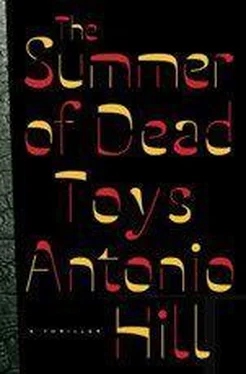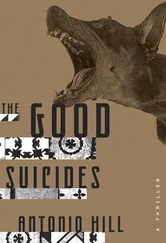Antonio Hill - The Summer of Dead Toys
Здесь есть возможность читать онлайн «Antonio Hill - The Summer of Dead Toys» весь текст электронной книги совершенно бесплатно (целиком полную версию без сокращений). В некоторых случаях можно слушать аудио, скачать через торрент в формате fb2 и присутствует краткое содержание. Жанр: Триллер, на английском языке. Описание произведения, (предисловие) а так же отзывы посетителей доступны на портале библиотеки ЛибКат.
- Название:The Summer of Dead Toys
- Автор:
- Жанр:
- Год:неизвестен
- ISBN:нет данных
- Рейтинг книги:4 / 5. Голосов: 1
-
Избранное:Добавить в избранное
- Отзывы:
-
Ваша оценка:
- 80
- 1
- 2
- 3
- 4
- 5
The Summer of Dead Toys: краткое содержание, описание и аннотация
Предлагаем к чтению аннотацию, описание, краткое содержание или предисловие (зависит от того, что написал сам автор книги «The Summer of Dead Toys»). Если вы не нашли необходимую информацию о книге — напишите в комментариях, мы постараемся отыскать её.
The Summer of Dead Toys — читать онлайн бесплатно полную книгу (весь текст) целиком
Ниже представлен текст книги, разбитый по страницам. Система сохранения места последней прочитанной страницы, позволяет с удобством читать онлайн бесплатно книгу «The Summer of Dead Toys», без необходимости каждый раз заново искать на чём Вы остановились. Поставьте закладку, и сможете в любой момент перейти на страницу, на которой закончили чтение.
Интервал:
Закладка:
The breath must have been louder than he’d thought because all eyes at the table were fixed on him. Aleix tried to turn his exhale into a cough with even worse results. The parental eyes went from surprise to distaste. And then, only then, he noticed a sour smell that seemed to be coming from him, and seconds later he saw that he’d just vomited up the little he’d eaten.
hey gi, you there?
Yeah
howd it go with the cops?
OK, good, I suppose. they left a while ago.
whatd you tell them?
Nothing, don’t you trust me?
yes, of course.
. .
. .
gi, love you a lot really.
:-)
really. . youre the only girlfriend i have. and i feel bad. . im bad.
Are you still taking? You’re still taking, right?
im going to bed. kisses
Fuck, aleix, what’s wrong? It’s only nine!
nothing, dinner didnt go down well. shit, its my brother. gotta go, talk tmrw.
Eduard enters his room with a serious expression, closes the door and sits on the edge of the bed.
“Feeling better? Mama was worried.”
“Yes. Just stomach cramp from the heat.”
His brother’s silence is obvious proof of his disbelief. Aleix knows it and for a moment he is tempted to unburden himself.
“You know you can trust me, don’t you?”
No, Aleix screams inside. I can’t.
Edu gets up from the bed and puts a hand on his shoulder. And all of a sudden Aleix is that frightened little boy again, waiting for the doctors in his hospital bed. The tears flow down his cheeks but he can’t do anything to stop them. He’s ashamed to be sobbing like a child but it’s too late. Eduard repeats in a whisper: “You can trust me. I’m your brother.” And his embrace is so warm, so comforting, that Aleix can’t hold back any longer and cries openly, without the least shame.
Gina kept staring at the screen for a few more seconds, asking herself why Aleix only spoke like that when he was doing it through a keyboard. Was it just him, or did it apply to all guys? Of course people didn’t go around saying how much they loved each other-it was embarrassing. That was something only her mother did, not realizing that repeating the phrase made it lose its value. It wasn’t possible to love a daughter who didn’t stand out in any way. People had to be loved for something. Marc, for example: he was tender, affectionate and he really smiled, with his whole face, and he explained maths problems, which for her were indecipherable hieroglyphs, with infinite patience. Or Aleix, who was handsome, clever, brilliant. Even when he was stoned. But her? She had no special gift, good or bad. She wasn’t pretty or ugly, tall or short; thin, yes, but not with the sensual slimness of a model, just thin: flat with no curves. For the second time that day she opened the photos she had uploaded to Facebook on San Juan. They were from the beginning of the night. From when they were still friends. From before the fight. But something strange was already in the air. In the afternoon, she and Aleix had agreed definitively not to go ahead with Marc’s plan. Now she couldn’t even remember the arguments Aleix had used to convince her, but at the time they had seemed reasonable. And she’d believed, naïvely, that this same reasoning would work to persuade Marc as well. But nothing had gone right. Marc had been furious. Really furious. As if they were betraying him. Gina closed her eyes. What had that nosy police officer said? “He’d met another girl, hadn’t he? In Dublin, maybe?” Gina hadn’t known what jealousy was until Marc returned. It was an emotion unfamiliar to her and nothing had prepared her for its force. It poisoned everything. It made you wicked, twisted. It made you say things that never would have occurred to you, do things that had never crossed your mind. She’d never thought of herself as a passionate girl: that was for films, novels, songs. . women capable of stabbing their boyfriends because they cheated on them. Ridiculous. Almost laughable. And in this case she didn’t even have the consolation of being the betrayed girlfriend: not in the strict sense of the word. It wasn’t his fault. Gina had spent months making believe they were boyfriend and girlfriend and telling herself over and over that some day, soon, he’d realize affection had turned into something more. How could she have been so stupid? So she’d had no choice but to swallow her jealousy, pretend it didn’t exist, force a smile disguising hatred as admiration. She’s pretty, isn’t she? Of course she was. Pretty, and blonde, and languid. A fucking Renaissance madonna. But the worst thing about this photo-the one Marc had shown her the day after he arrived, just after she confessed that she’d missed him very much, to which he responded, “Yeah, Gi, me too,” not looking at her, not making the phrase any more meaningful while he searched the file for said photo-wasn’t that the girl in question was pretty. The worst, most painful thing was seeing Marc’s eyes as he looked at it. Like he wanted to learn her by heart, like he felt the softness of her hair by touching the paper, like he discovered something new and marvellous in that face every time he looked at it.
Lucky she’d taken that photo. Surprisingly, it was the first thing she’d done after seeing Marc broken on the patio floor. So no meddler would find it, like that cop who was pretending to be nice and to whom it would confirm what she was already guessing. That Gina wasn’t good enough for Marc. That there was another girl. That on San Juan she’d asked her mother to help her choose a dress and put on make-up for the first time in years. Why not? This Iris might be beautiful, but she was just a photo. She wasn’t real. She wasn’t there. In a way, she wasn’t even alive. But Gina was.
She took the photo from her drawer and leaned it against the keyboard. She’d have liked to burn it, but she had nothing with which to do so in her room, so she settled for cutting it with scissors: first through the middle at nose height, and then she continued cutting it into pieces until it was reduced to one of those jigsaws with hundreds and hundreds of pieces, each so diminutive that they are unrecognizable in themselves.
13
If a man’s study is a reflection of his personality, Enric Castells was a sober and organized individual like few others. His study could have been the set of a legal thriller starring Michael Douglas, thought Héctor, as he sat on the stiff yet comfortable black leather chair and waited for his host to decide to tell him why exactly he’d wanted to speak to him. Castells took his time: he lowered the blind carefully, pulled back the chair on the other side of the glass-topped, aluminium desk, and after sitting down he moved a shiny black antique telephone at one end slightly, barely millimetres. Héctor wondered if it was a calculated choreography to unnerve or exasperate his interlocutor, but Castells’ face showed intense concentration, a worry difficult to feign. He must have been an attractive man before the years and responsibilities left him with that bitter sneer on his thin, slightly turned-down lips, and an expression of perpetual dissatisfaction which spoiled his appearance. His eyes were small and a faded, tired blue, tending to gray. Suddenly, Enric Castells exhaled slowly and leaned back. For a moment, his wrinkles relaxed and showed the face of someone younger and more insecure: definitely more like young Marc.
“This afternoon I spoke to my ex-wife.” The irritated expression had once again taken over his appearance. “It upsets me to say it, but I think she’s mad. On the other hand, it was to be expected.”
“Oh?” Héctor stuck to his technique of saying as little as possible. Apart from which he didn’t really know what to say to something like that.
Читать дальшеИнтервал:
Закладка:
Похожие книги на «The Summer of Dead Toys»
Представляем Вашему вниманию похожие книги на «The Summer of Dead Toys» списком для выбора. Мы отобрали схожую по названию и смыслу литературу в надежде предоставить читателям больше вариантов отыскать новые, интересные, ещё непрочитанные произведения.
Обсуждение, отзывы о книге «The Summer of Dead Toys» и просто собственные мнения читателей. Оставьте ваши комментарии, напишите, что Вы думаете о произведении, его смысле или главных героях. Укажите что конкретно понравилось, а что нет, и почему Вы так считаете.












